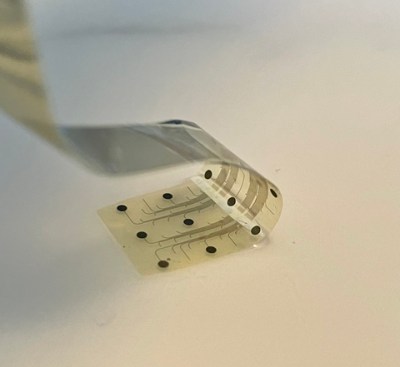Implantable electrodes for the (human) brain have been around for a many decades in the form of Utah arrays and kin, but these tend to be made out of metal, which can cause issues when stimulating the surrounding neurons with an induced current. This is due to faradaic processes between the metal probe and an electrolyte (i.e. the cerebrospinal fluid). Over time this can result in insulating deposits forming on the probe’s surface, reducing their effectiveness.

Now a company called InBrain claims to have cracked making electrodes out of graphene, following a series of tests on non-human test subjects. Unlike metal probes, these carbon-based probes should be significantly more biocompatible even when used for brain stimulation as with the target goal of treating the symptoms associated with Alzheimer’s.
During the upcoming first phase human subjects would have these implants installed where they would monitor brain activity in Alzheimer’s patients, to gauge how well their medication is helping with the symptoms like tremors. Later these devices would provide deep-brain stimulation, purportedly more efficiently than similar therapies in use today. The FDA was impressed enough at least to give it the ‘breakthrough device’ designation, though it is hard to wade through the marketing hype to get a clear picture of the technology in question.
In their most recently published paper (preprint) in Nature Nanotechnology, [Calia] and colleagues describe flexible graphene depth neural probes (gDNP) which appear to be what is being talked about. These gDNP are used in the experiment to simultaneously record infraslow (<0.1 Hz) and higher frequencies, a feat which metal microelectrodes are claimed to struggle with.
Although few details are available right now, we welcome any brain microelectrode array improvements, as they are incredibly important for many types of medical therapies and research.
















Interesting. It’s a start, I think. I had to sigh when I read “a company” though.
I hope it’s not again some commercial venture that closes its doors soon and then leave patients (test subjects) on their own.
Such inventions should always be well documented and not proprietary, so that there’s no monopole situtation and someone else can step in to continue treatment.
Do you want it made or not? That’s why a company is doing it. And it’s a company that’s already gone through the experiments in non-humans. Besides that, they are trying to help people in the last stage of their life with a product that shouldn’t (hopefully) need any support afterwards.
I want these inventions to be proprietary, because that’s the entire reason they are made. If it wasn’t proprietary, there would be no reason for the company to make this in the first place. Now sure, there are a lot of things wrong with how patents and copyright works and a complete overhaul is needed. I wish you couldn’t sell patents and I wish they automatically expired when a company folds, but a system needs to be in place, or inventions like this will never be made. If you remove the entire incentive, then we will never find a cure.
I’m all for opensource, but we do need to find a way to progress and not stop any future progress.
Perhaps to balance the various interests involved…
Companies would be allowed to patent novel inventions for a time. But to get FDA approval all the details necessary for working with such an implant, after the patent holding company has shut doors has to be stored at some sort of escrow house. If the company closed shop and the IP buyers don’t pick it up where left off, or even if they just abandon the product.. then it all becomes public domain so that anyone else can help the existing patients.
“though it is hard to wade through the marketing hype to get a clear picture of the technology in question.”
By having a wife who writes and reviews research papers; I have learned that “hype” is detrimental to the audience that wants “Just the facts Ma’am!”
I think even The Journal of Irreproducable Results did not allow hype in their articles.
I would like to subscribe to that journal
It went out of business, not sure if it was successfully resurrected.
See if your local library has any.
regenerative healthcare means instead of making a terrible prosthetic, with bci, that adds cybervulnerabilities to your brain, we can just regrow tissue & transplant new organs & bone
much less problematic
http://DX.DOI.ORG/10.1021/ACSANM.4C02701
Recent Advances in Gelatin Methacryloyl Hydrogels for Bone Regeneration
https://pubs.acs.org/doi/10.1021/acsanm.4c02701
I am firmly anti-BCI because we don’t even have safe and secure computers yet.
Even if the neural scarring and immune rejection issues are overcome the technology itself is not secure.
Finally, even with wireless, non implanted BCI, ethical issues
Ethical aspects of brain computer interfaces: a scoping review
https://www.ncbi.nlm.nih.gov/pmc/articles/PMC5680604/
This paper refers to scarring in Glial neurons and tissues, and cites 2 sources which I also link here:
“For long-term implants, the affected neural tissue may also develop glial scarring, which can surround the implant and impede BCI function [25, 31]”
25) https://pubmed.ncbi.nlm.nih.gov/23558502/
Clinical ethical concerns in the implantation of brain-machine interfaces
And
31) https://pubmed.ncbi.nlm.nih.gov/26497727/
Informed Consent in Implantable BCI Research: Identifying Risks and Exploring Meaning
As an engineer, if the cure/implant isn’t reliable or secure it’s a failure.
If it violates your human rights or privacy, it’s also a failure.
I was also dismayed hackaday lauded the graphene bci instead of speaking on the security or rather lack thereof, as well ethical issues.
I usually enjoy Maya Posch’s writing and her coverage wasn’t bad but it left many holes and didnt ask any of the hard questions that I would have normally expected of her, like the nuclear reactor piece had more objectivity.
As a person who studied biomedical engineering and understands computing, I feel like it’s my duty to warn people about this because nobody stepped up and protected our privacy or data rights with computers, and I’ve already been hacked and neurosurveilled without my consent.
There is nothing to stop anyone else from being abused and the folks you would expect to be smart enough to catch it or write about it are not doing so.
I also posted this as my latest thought on zedtopia — a censorship free platform — https://www.zedtopia.com/azeem